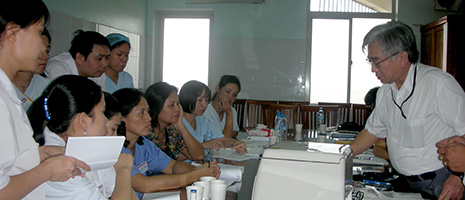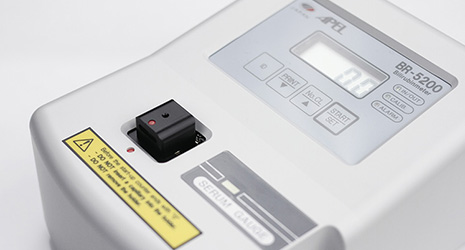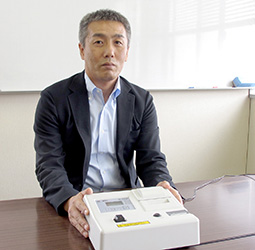Home > Highlighting JAPAN > Highlighting Japan July 2017 > SMEs Overseas
Highlighting JAPAN


Bilirubin Meters for Vietnam
A small company in Kawaguchi, Saitama Prefecture, has been trialling its instrument for the screening for jaundice in newborn infants in Vietnam.
Newborn infants often develop jaundice. This type of jaundice is called neonatal jaundice, and in many cases, the symptoms disappear naturally within about two weeks as the liver of the newborn infant develops. In rare cases, however, the elevated level of bilirubin in the blood, which is the cause of jaundice, remains too high and does not decrease. In mild cases, newborn infants recover with simple treatment, but in developing countries, some symptoms may not be detected and may become severe.
APEL Co. (APEL), a Japan-based medical device and analytical instrument manufacturer with only fourteen employees, is currently working to solve this issue by disseminating the use of simple testing equipment.
These days, the Ministry of Foreign Affairs of Japan (MOFA) is working jointly with the Japan International Cooperation Agency (JICA) on matching the development issues in developing countries with the knowledge and technology of Japanese Small and Medium Enterprises (SMEs). APEL’s project “Improvement of Neonatal Healthcare through Introducing Inspecting Equipment for Neonatal Jaundice” was adopted as a “Project Formulation Survey” under the Governmental Commission on the Projects for ODA Overseas Economic Cooperation by MOFA for FY2013.
APEL researched a Provincial Hospital and several District Hospitals in Hoa Binh (Province) in Vietnam. Large, expensive biochemical testing equipment capable of testing of more than ten items was introduced as a result of the support of developed countries. However, because some of the District Hospitals, where people in Vietnam usually see a doctor, are not provided with the equipment and specialists in newborn infants do not work in such hospitals, patients are referred to a higher-level Provincial Hospital. The Provincial Hospital was crowded with patients waiting for their turn for testing. In addition to the large number of patients, it takes money and time to undertake testing with biochemical testing equipment because a test reagent needs to be added to the blood specimen. A bigger problem is that advanced skills are required for blood specimen collection, as injection needles must be inserted into the veins of newborn infants. In addition, the amount of blood necessary for testing is a physical burden for newborn babies.
“The testing equipment required on the medical front in developing countries is not necessarily high-performance equipment. The quality of products made by major Japanese manufacturers has won the trust of people around the world. For SMEs like ours, maintaining the quality ‘expected of products made in Japan’ in our inexpensive product with limited functions is an opportunity to show our company’s technology,” says APEL President Mitsuru Kashiwada.
APEL’s core technology is optics technology. The bilirubin meter with this technology is characterized by the fact that first, it does not need a reagent and second, no injection needles need to be inserted into the veins of newborn infants. A tiny scratch can be pricked on the sole of the foot of a newborn infant with a needle, and the blood from the scratch can be sucked into a very fine glass tube. The blood specimen is then centrifuged for about five minutes and fed into the meter. The value is measured immediately. Because APEL have limited the function of their testing equipment to the measurement of bilirubin, they can manufacture the equipment at a low cost and make it into a small, lightweight device. Even when combined with a centrifugal separator, the equipment can be installed in an outpatient clinic. No difficult operation is necessary when the testing equipment is used, and the bilirubin level can be measured immediately.
In 2014, JICA also adopted APEL’s project “Verification Survey with the Private Sector for Disseminating Japanese Technologies for Promoting Prompt Diagnosis and Treatment of Neonatal Jaundice in Vietnam” as part of its Support for Japanese SMEs Overseas Business Development. APEL introduced its bilirubin meter into eleven County Hospitals in Vietnam on a trial basis, demonstrating the accuracy of the test. The company provided training courses on jaundice in newborn infants and on the method for using the meter at the same time as introduction on a trial basis, receiving a high evaluation from the healthcare bureau of the province and the healthcare providers on the medical front. The project is currently in the phase of dissemination/demonstration, and training to raise awareness of jaundice in newborn infants is provided to each household.
In Vietnam, it has become common for pregnant women to give birth in hospital, but because they are usually discharged from hospital the day after delivery and return home, the symptoms of jaundice in newborn infants are often not noted.
“In addition to our own meter, we ask other small medical device companies like ours in Japan to provide light therapy equipment for jaundice in newborn infants. We are now making efforts to establish a system from diagnosis to treatment in the outpatient clinics of District Hospitals. This is the first time that our company has worked through this type of cooperation, and it is a valuable experience for us,” says Kashiwada.
The challenge that the company is now facing is to have the testing with their bilirubin meter covered by insurance in Vietnam. When this coverage is approved, commercialization will finally begin.
“The provision of technology and a product began as a project under MOFA and JICA. We now meet healthcare providers in the local area of Vietnam directly and can receive valuable comments and feedback. I think that there is a special contribution that only small to medium-sized companies can make. We hope that we will continue to manufacture products that can help patients and the doctors at their side,” says Kashiwada.
A small company motivated by its power to improve neonatal medical care is making significant strides on the international stage.
© 2009 Cabinet Office, Government of Japan







